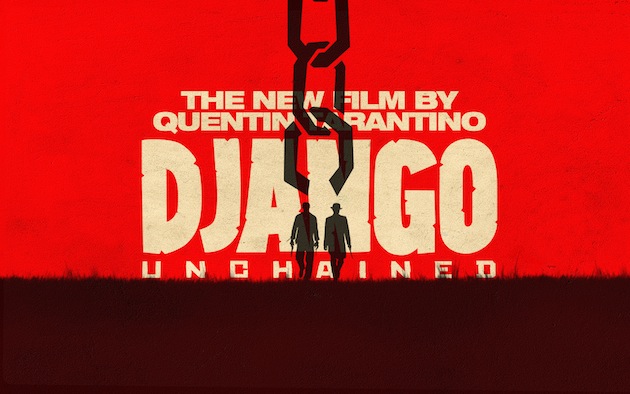 Tarantino is at it once again with his latest film Django Unchained which was released in theaters this Christmas day. This modern day spaghetti western stirs Tarantino’s recurring anthology of a revenge-themed film. “Django Unchained,” set in the South circa 1858 (2 years before the civil war), depicts a recently sold slave, named Django (the D is silent), played by the enigmatic (Jamie Foxx), is freed by bounty hunter Dr. King Schultz (Christoph Waltz), in order to help him identify and locate his latest bounty.
Tarantino is at it once again with his latest film Django Unchained which was released in theaters this Christmas day. This modern day spaghetti western stirs Tarantino’s recurring anthology of a revenge-themed film. “Django Unchained,” set in the South circa 1858 (2 years before the civil war), depicts a recently sold slave, named Django (the D is silent), played by the enigmatic (Jamie Foxx), is freed by bounty hunter Dr. King Schultz (Christoph Waltz), in order to help him identify and locate his latest bounty.
During their first outing together, the two form a strong working bond, and that bond is solidified as Dr. Schultz teaches Django the ins & outs of the bounty hunter business such as tracking, the quick draw, and accuracy in ‘the shoot’. Schultz also gives Django the greatest no-no of all, the gift of reading. When Django pays off his original debt to Dr. Schultz he has a new purpose, to locate & free the love of his life, his beautiful enslaved wife Broomhilda (Kerry Washington), who was separated from him through her sale at a slave auction.
Tarantino’s signature snappy dialogue is observed heavily throughout the film, and many such scenes give you the feeling that maybe this is not the place to laugh, or it’s wrong to laugh, but the jokes hit while at the same time solidifying your awareness that this is truly another time and another place and definitely another world, far from our existence of today. As you realize that what you’re observing on the screen, you have been blessed to have not had to experience, somewhere in your deepest recesses, give pause to similar experiences, at all times noting that nothing comes close to what Django and the other slaves are experiencing, that nonetheless, the experiences have a personal ringing of familiarity on certain levels.
The energy between the stately slave owner Calvin Candie (Leonardo DiCaprio) and the most evil of characters to be depicted on the screen in a great while, Candie’s “head house nigger” Stephen (Samuel L. Jackson, whose performance evokes shudders), was palpable anytime the two were in frame with dialogue together. Which invokes difficulty when choosing who had the standout performance in the film.
Django, is a truly great movie that is at times, a little hard to stomach. The many moments of some of America’s greatest injustices and atrocities, are laid out, bare on the silver screen, and depicted as they were, merely everyday occurrences. But don’t be mislead, Django is first and foremost, a story of the love that a man has for a woman. Depicted is a hard, strong, committed and earthy kind of love, between two people whose need to be together, is so much larger than the disdain Whites felt regarding the color of their skin. The movie doesn’t preach to you regarding the ills of slavery, it just shows you the limits a man will go to and endure to make sure that the woman that he has committed himself to love, is safe from all harm.
The music for the film is truly distinct with Tarantino bringing together some of the most eclectic sounds. From the master of spaghetti westerns, there is composer, Ennio Morricone (“Two Mules for Sister Sara” score) to rapper Rick Ross (“100 Coffins”) to jazz musician Anthony Hamilton’s “Freedom” with Elayna Boynton, to R&B singer John Legend’s soulful “Who Did That to You?” and lest we not forget to pay homage to the film’s main theme, Django, composed by Luis Bacalov, which Tarantino himself is sung in a quasi-Elvis style, by Rocky Roberts, and is the original 1966 title track of the movie Django.
Visually stunning.
Aesthetically captivating.
Tarantino may have released the best film of 2012.


